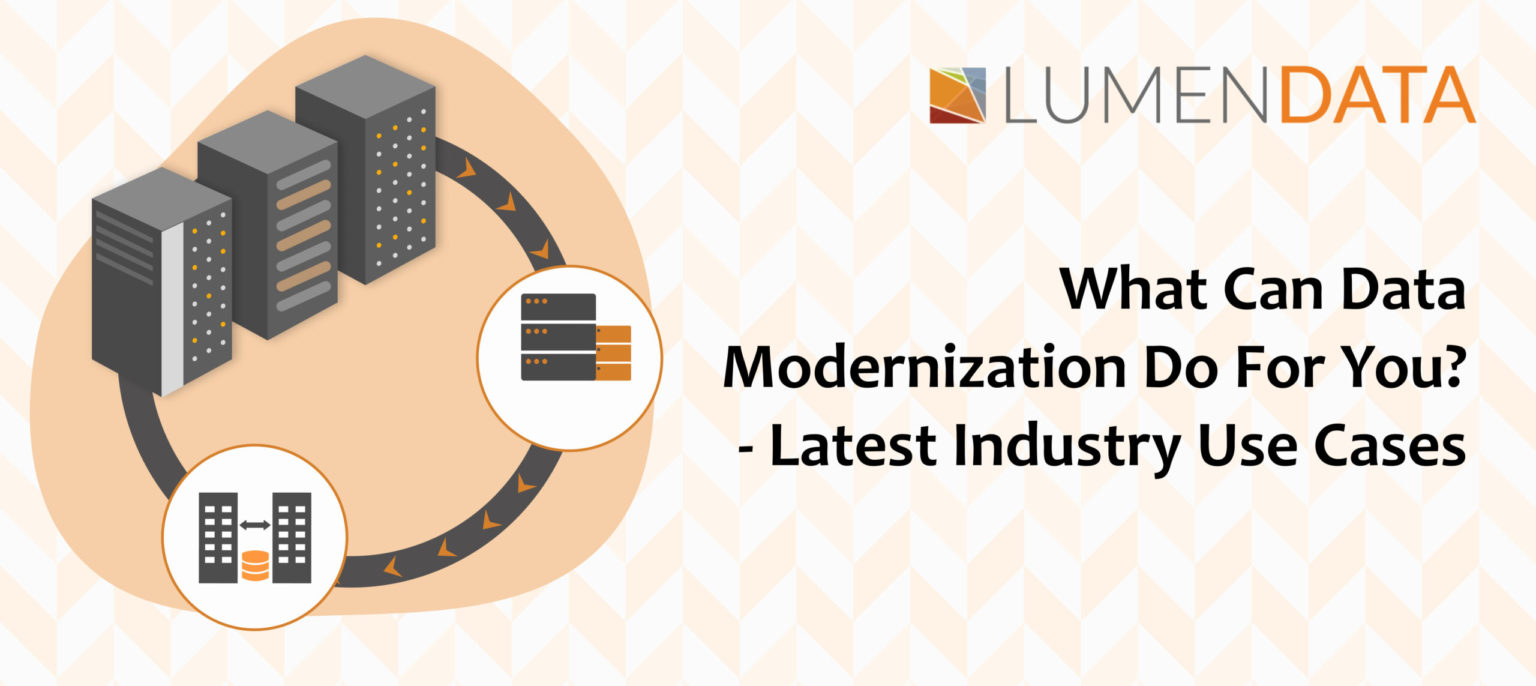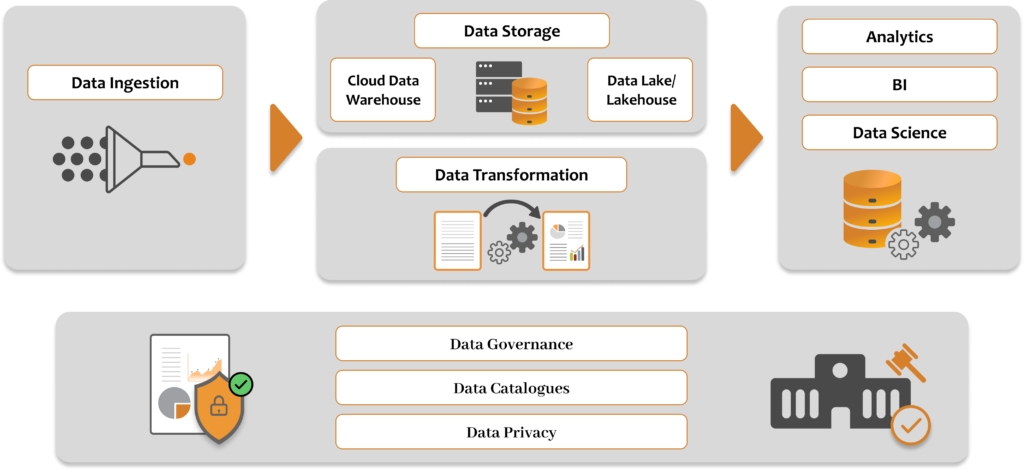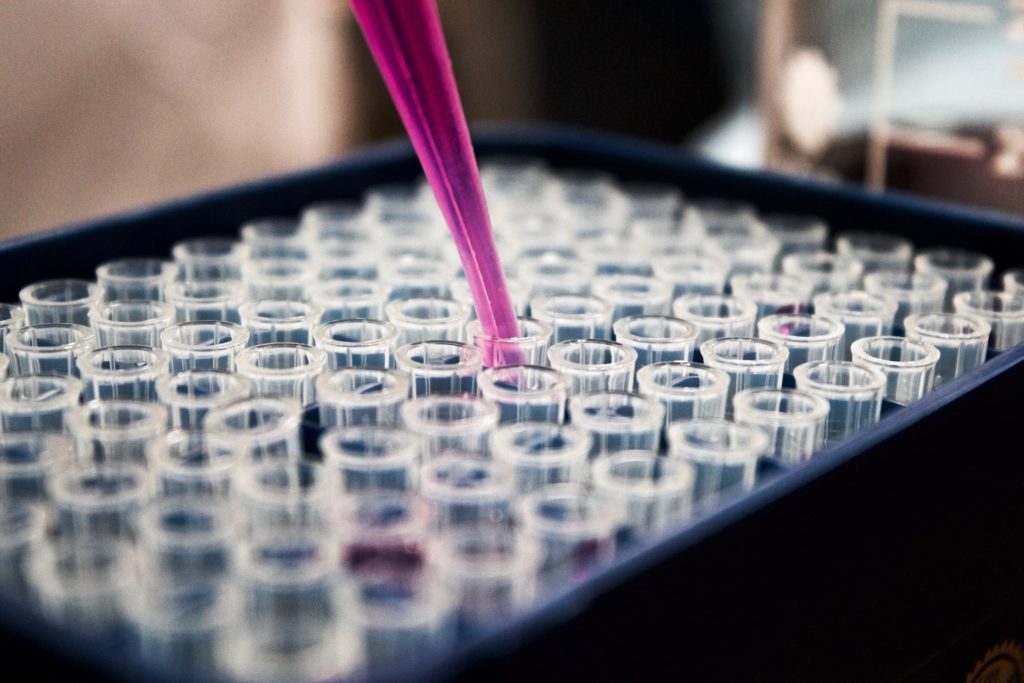Given the huge volumes of data generated every day, organizations must continually adapt and modernize their data infrastructure to remain competitive. Enter the concept of data modernization!
This blog digs deep into the critical aspects of data modernization:
- Definition of data modernization
- Importance and core components
- Industry use cases
What is Data Modernization?
Data modernization is the transition of an organization’s data from legacy databases to modern databases. It is the process of updating and optimizing a company’s data-related technologies, processes, and infrastructure to address the digital age requirements.
Layers of modern data architecture
Data modernization helps solve multiple challenges related to traditional data architectures. Legacy systems often create data silos and make it difficult for companies to access and analyze data across teams and departments. Modern data architecture helps establish a more connected data ecosystem.
Core components of data modernization
1. Data integration
Creating a unified view of data across the organization by combining data from different sources and systems. Modern data integration tools are used to connect structured, semi-structured, and unstructured data.
2. Data governance
Implementing policies, processes, and standards to effectively manage data across an organization. Data governance ensures improved data quality within the company.
3. Cloud computing
Leveraging cloud-based platforms and solutions to store and process data efficiently. Data is migrated from legacy on-premises systems to cloud-based infrastructure to improve scalability.
4. Data warehousing
Creating a centralized repository to store, clean, and manage data from multiple sources. Modern data warehouses offer features like in-memory processing, data compression, and others to store and analyze data.
5. Advanced analytics
Using modern technologies like machine learning, artificial intelligence, and predictive and prescriptive analytics to derive insights and enhance decision-making and relevant business operations.
Industry use cases
1. Retail
The retail industry generates a vast amount of data including customer transactions, inventory data, and more. Switching to modern databases can help retailers gain a better understanding of customers’ preferences, behavior, and purchasing patterns. Advanced analytics and machine learning can be used to personalize marketing campaigns and make targeted offers. Predictive analytics can be leveraged to identify potential sales opportunities and optimize supply chain efficiency.
2. Healthcare
The healthcare industry can leverage electronic health records to gain a comprehensive view of patients’ medical history, medical conditions, and other relevant health information. Advanced analytics technologies like machine learning and artificial intelligence help healthcare entities predict patients’ risk of developing certain medical conditions. This, in turn, enables healthcare organizations to intervene early and prevent complications. With effective data modernization, healthcare organizations can improve patient outcomes and cut extra healthcare costs.
3. Higher education
Modernizing database systems can help educational institutions to personalize learning experiences and facilitate student success. Data analytics can be leveraged to comprehend the strengths, weaknesses, and preferences of students. It enables educational organizations to recommend courses or other necessary resources that can help students succeed. Predictive analytics can be utilized to identify at-risk students and improve student outcomes.
4. Manufacturing
The manufacturing supply chain involves multiple suppliers, raw materials, and distribution channels, making it quite complex. Modern data technologies can be used to monitor and track the movement of goods, predict demand, and manage inventory levels. New-age data monitoring tools can be used to detect quality issues in real-time. Data analytics can be leveraged to predict and detect equipment failures and production bottlenecks.
5. Finance
Implementing advanced analytics and machine learning algorithms can help financial institutions with fraud detection and prevention. Modern data platforms can be used to store and analyze customer data and generate better insights into changing customer behavior and preferences. With advanced customer analytics, financial entities can personalize products and services to boost customer satisfaction. Modern data technologies streamline regulatory compliance by enhancing data quality and automating crucial compliance processes.
Power your data modernization journey with LumenData
LumenData helps businesses across industries to implement a modern and flexible data architecture and enhance data transparency and democratization. Our expertise with cloud and hybrid architecture helps companies adopt a modern data approach and improve agility. We help implement the latest tools and technologies to meet changing business needs.
Together with valuable partners, including Informatica, Snowflake, Reltio, Oracle, BigID, and other leading companies – we ensure the right technology selection for your unique business strategy and project success.
We are privileged to serve over 100 leading companies, including KwikTrip, Versant Health, US Food & Drug Administration, US Department of Labor, Cummins Engine, BCG, and others. LumenData is SOC2 certified and has instituted extensive controls to protect client data, including adherence to GDPR and CCPA regulations.
Connect today to discuss how our data modernization initiatives can drive innovation for your business.
Authors:

Shalu Santvana
Content Crafter

Ankit Kumar
Technical Lead

Shalu Santvana
Content Crafter

Ankit Kumar
Technical Lead








